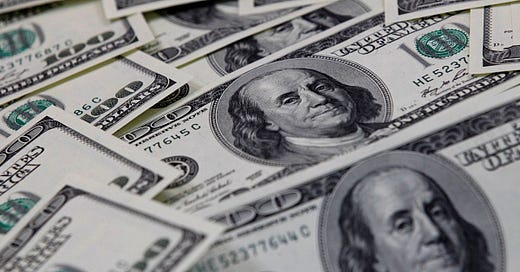For the last six years, I have been emphatically preaching to anyone willing to listen that the best place to be invested in the equity markets is in the digital space. I have also alluded that the best value-for-money scrips in this space can mostly be found in India. For that matter, the changes and the digital revolution that is happening in India are still in their early stages. While India has shown great strides in many areas of the digital infrastructure - the introduction of the pan-India UID number through the Aadhaar card, the National Stock Exchange’s computerization, developments in the medical and telecommunications space - the digital space is still in a nascent phase.
What is very exciting is the government signaling its interest in a CBDC. The Finance Minister in her latest budget announcement made it very clear that a digital version of the rupee is in the making. Actually, this is a very big thing considering the population of the country and the diaspora of Indians living around the world.
About 90% of the world’s central banks are working on digital currency. In a true sense, none of them will be a blockchain product. They may have certain features of blockchain but will not adhere to blockchain’s most important quality of its permissionless decentralization. Central banks will not want to give up control of their currency. On the flip side, there is heightened risk and concern that they will use the digital currency to gain more surveillance and censorship. This will become a very debatable issue at all levels of government (legislature, executive and judiciary) in all democratic countries that intend to introduce a CBDC.
So far, China is the only major country to announce its own CBDC. Other than China, most CBDC projects have been led by small Caribbean island countries. China is much ahead of all other developed and developing countries on this matter. They had planned much before to pilot test it at the Winter Olympics and they are using it as an approved method of payment.
Therefore, India’s move to introduce digital currency can have even bigger implications. China and India make up 2.8 billion people of the 7.9 billion that are on this planet. Meaning only two countries will make up 35% of the world’s population that will be living within a CBDC dominated financial system. That’s incredible!
This will also force the hand of all the other major population groups to hasten their CBDC launch plans.
Very recently, the Federal Reserve released a paper highlighting the risks and benefits of a digital dollar. The Fed has repeatedly said that they will first look for public consensus and it will be a Congress decision to introduce the digital dollar. With all the developments in the rest of the world, the Fed could quickly act on this and probably wait to clear some of SEC’s heavy-handed regulations (or regulatory overreach) with regard to cryptocurrencies and other digital assets to put on a clearer framework. It looks like all these matters will be hotly debated and eventually cleared by Congress.
Meta (Facebook) who took so much initiative to introduce a digital dollar firstly through a product called Libra and then name-changed to Diem has completely given up on it. They did not get any support from Capitol Hill and finally sold their project to Silvergate Bank for $182 mn.
While India has warmed up to the idea of a CBDC, they have also said that they will tax any income that is generated from digital assets other than its CBDC like cryptocurrencies or NFTs at 30%. That’s basically going to kill any innovation that can happen within the country (or worse drive many underground or offshore).
Finally, we hope that the regulators and policymakers will find a common ground in consultations with the Chamber of Digital Commerce, Blockchain Association and other bodies that are out to improve innovations and better quality for mankind.
If you received value from this post, and you’d like to send some back, or if you’d like to signal to me to continue spending time on these types of explorations, feel free to buy me coffees (thank you!):
So, there we go. Thanks for reading Breezy Briefings. If you enjoyed this, I'd really appreciate it if you could take a second and tell a friend. Honestly. It makes such a big difference.
Forward this email. Recommend the newsletter. Share on Twitter, WhatsApp, Telegram, LinkedIn, Slack, wherever!
Join Breezy Briefings’ Official Telegram Channel: https://t.me/BreezyBriefings
Abraham George is a seasoned investment manager with more than 40 years of experience in trading & investment and multi-billion dollar portfolio management spanning diverse environments like banks (HSBC, ADCB), sovereign wealth fund (ADIA), a royal family office and a hedge fund. Currently, he is a co-founder of a new hedge fund where foreign citizens can invest in Indian growth stocks like Tanla operating in hyper-growth markets like CPaaS.



